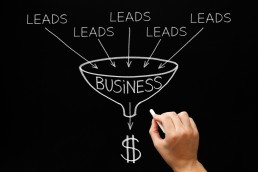Expansion Plan: How to Grow Your Business With Sales Leads
Business has changed in the past few years, just like it will change in the future. This is the reality of the world, but few things have changed quite so radically as the importance of sales leads.
And yet, despite their importance, some business owners don't even really know what sales leads are! That's why we've taken the time to explain exactly what sales leads are, why they are important, and how you can use them to grow your business.
Sales Leads: What Exactly Are They?
First and foremost, what exactly are sales leads? To put it simply, a sales lead is an individual or company that is a potential customer for your company.
Leads are one of the earliest stages in the customer retention process. This process, roughly, is followed like so:
Stranger - Visitor - Lead - Customer - Promoter.
As you can see, leads occupy a unique and important position in this model. Leads are people who know you exist, who you communicate with, and who you are working to turn into a paying customer.
Back in the day, you'd generate sales leads by attending networking shows and conferences within your sector. While this is still a valid method, technology has allowed for even more ways of generating sales leads for your business, just like it has transformed advertising.
Before we go into those, we're going to briefly tell you why this is important.
Why Are Sales Leads Important?
Leads are important because they're one of the most reliable ways to generate customers for your business. They serve as a way of linking like-minded people with your business and allowing them to interact with your brand.
They are a better method than just cold-calling. This is because the customer is choosing themselves to be contacted by your business (with a little push on your end).
This makes a customer feel that they are in control of the process and aren't receiving unsolicited adverts from a business.
Leads aren't just vital for converting customers, they're also an excellent way of generating data for your company. This data can then be used to make real business changes and to recognize and solve potential problems.
But though all leads are important, there are different kinds of leads to bear in mind.
Understanding Different Leads
To properly use sales leads to grow your business, you need to know which leads to focus on generating. There are typically four main recognizable leads, as follows:
Information Qualified Lead
An IQL is someone who becomes a lead to learn more about your company. To incentivize these leads you can offer information-based rewards like a catalog, a discount, or a free sample. This is known as a cold lead and, though still important, is the lowest lead option.
Marketing Qualified Lead
An MQL has seen your marketing and is prepared to engage with your business; they just aren't quite ready to become a paying customer yet. These leads will often fill out forms on landing pages for continued information and advertising from your company.
A good way to turn these leads into customers is by using a problem-solving contact form, where your employee can contact them to let them know how your business can help.
Sales Qualified Lead and Product Qualified Lead
SQLs and PQLs are leads that have shown the most interest in your business. The main difference is that PQLs have shown interest in a specific product through a free trial or base version of your software.
A good example of an SQL is someone who has used a contact form on your website to ask a specific question.
Understanding the differences between these leads is vital to maximizing their impact on your business. You will need to use a combination of all of them to operate successful lead generation in your company.
Lead Generation Strategies
Now you know all the basics of lead generation, it's time to learn some strategies to use in implementing your sales leads.
Today, many sales leads are generated through technology. Some popular approaches include emails, social media posts, and blog posts that are then funneled to a landing page. Mobile strategies are also a very popular lead generation tool.
You need to create a designated landing page with a well-made Call to Action (CTA) that will encourage people to become leads. People won't usually do this for the fun of it - there often needs to be an incentive.
Think about things you could offer that could incentivize leads, as this will differ depending on your business. Some reliable options include discount codes or free trials on specific products.
Or, it could include further information on a product or the promise of continued communication with an experienced employee. Think about which kind of lead you're looking to generate, and create an incentive accordingly.
Another popular option for businesses these days is to buy leads. This is a much quicker process for businesses that have a large marketing budget that isn't yet being put to good use.
Buying leads can be a cost-effective way to get started on your lead generation. This is because it allows your company to obtain a large number of leads right off the bat.
You can then dedicate time to transforming these leads into customers.
Where Can I Get Help With Lead Generation?
If you need further assistance with your sales leads generation, you're already in the right place.
As part of our comprehensive data plans, we offer real-time lead deliveries that can funnel leads directly to your company. This can be done on a weekly schedule to ensure you are always receiving new contacts that can turn into customers.
If you're interested in finding out more about how Sales Data Pro can help you, make sure to contact us directly. That way, one of our experienced team members will be on hand to assist you.
Why You Need to Invest in Your Business and Buy Leads
Around 70% of customers say they would be willing to spend more on products from companies that they trust.
But in order to have customers that trust your business, you need leads. You need leads that come through your funnel, are introduced to your business, and become lifelong customers.
But how do you generate leads?
You can either have them come to your business organically, which means they find your business with a blog post, a Google search, a referral, or something else.
Or you can buy leads.
Buying leads offers a lot of benefits that you should consider for your business. It's faster than waiting for leads to come in organically and offers other benefits.
Read this guide on why you need to invest in your business and buy leads.
Buy Leads If You Don't Have a Great Funnel
If you have sales funnel in place for your business and it's not doing as well as you hoped, buying leads is a great solution.
You may not have time to redo your funnel or tweak it. You need leads fast and need them to purchase from your business.
When you buy leads, it gives you time to assess what's wrong with your funnel. You can figure out what part of the funnel, from awareness to action was a weakness.
You can figure out if your funnel needs a better lead magnet, better copywriting, or something else.
It's important to remember that buying leads shouldn't be a long-term solution. It should be a short-term solution to help you figure out what is wrong with your funnel.
The goal should always be to warm up your leads and spread awareness. But in order to reach that point, you need a funnel that is going to be effective.
That's why buying leads while you work on your funnel is an effective short-term solution.
You Have Limited Resources
If your business is in its early stages, you may have limited resources to spend on marketing and your funnel. You may not have an email campaign set up, Facebook ads, Google ads, and more.
All of that can cost a significant amount of money. That's the benefit of buying leads.
Until you have everything up and running with your funnel, you should consider buying leads. As mentioned before, they are a short-term solution.
You can generate profit by buying leads instead of waiting months for your entire funnel and marketing strategy to develop.
You Can Buy Quality Leads
While you may think buying leads doesn't produce quality leads, it actually does. When buying leads, you can specify industry, jobs, location, and more.
Some databases allow you to be as specific as interest. The more specific you are about your target audience, the more likely you'll find people interested in what you're selling.
It offers you an opportunity to have a lifelong customer.
However, it's important that when you buy quality leads, you still have a system for taking them through your sales team. You can't assume they will buy because they are more targeted.
You have to have a master sales system that can help you land these leads into clients. If you want to learn about direct sales marketing and how it can help your sales team, read the blog post here.
You Can Improve Your Sales
Buying leads also gives your sales team a chance to improve their tactics. You can figure out how to respond to leads and how to sell them on your product.
if you buy a bundle of leads, it's an opportunity to figure out your target audience before they start coming organically. It's an opportunity to practice sales calls, figure out what to say that is going to make someone buy your product.
You can also increase your conversion rate on a sales call.
You can do this by having a following-up system with an email or a phone call. Overall, buying leads helps your sales team practice with leads and generate a faster ROI.
A Faster ROI
Buying leads also helps your business generate a faster return on investment. Since most leads you buy arrive instantly, it means you can generate sales immediately.
In addition, you can figure out how much you paid for the leads and how many sales from these leads it would take to generate an ROI.
Saves Time
Finally, it's important to know that buying leads saves time. You don't have to wait for your funnel to be ready. You don't have to wait to have the perfect sales message.
Buying leads is instant and gives an opportunity to generate an ROI right away. The time you save when you are buying leads help you prioritize other parts of your business.
You can focus on lead generation, on the sales team, on a marketing strategy.
Ultimately, collecting data by buying leads can help you improve your business in every area.
Why You Should Buy Leads
Buying leads offer a short-term solution to figuring out your marketing strategy. It gives you time to figure out what part of your funnel you need to improve and how to drive in leads organically.
But buying leads is a way to help promote your business without a working funnel. When you buy leads, they are often quality and can get you a faster ROI.
If you want to see what kind of leads we offer, you can check out our website and see our data packages.
Understanding the Importance of Data Collection for Your Business
The better data you have, the better ROI you'll have for your business. That's why data and analytics are so important to your marketing and sales team for your business.
The importance of data collection is seen in your ROI and how well you know your customers.
It helps you create a strategic marketing plan around the customers. It helps you develop a driving force in sales.
But to achieve those sales, you need to understand the value of data collection.
Here's a guide that can help you see the value of data collection.
You Better Understand Your Market
The more data collected on your audience, the more you know about them that will help you figure out their needs.
With any market, you have to understand their needs. It isn't a good idea to make a guess on what they want in the market. That's why it's important to figure out a specific audience, figure out their problems, and what their needs are.
You can figure out their needs by understanding why data is important for your business.
The data should show demographics, age, location, interest, and perhaps behavior. It should help you figure out if you are targeting male or female.
By understanding this kind of data, you know who to sell to in the market. You know what kind of audience is most likely to buy from your business.
The goal is to improve the customer experience. The data allows you to do that.
The more data you have and what it says about your customer can help you change up your sales calls.
It can help you figure out what the follow-up message should look like and how often you should follow-up. It guides what your sales call script looks like.
If you want to learn more about sales calls, especially retention in your sales calls, read this blog post.
You Know What Marketing Strategies Will Work Best
The data information you have on your target audience will help you create and implement marketing strategies.
The data will help you form email marketing strategies that are more personalized. It speaks to a specific person rather than anybody.
If you were creating a Facebook campaign around your core audience, the data would help you figure out demographics and interest. You would have more success with Facebook ads because you know who you are targeting.
The cost per lead would be lower. The open and click-through rate would be higher. The overall metrics would be better.
More importantly, you know what marketing strategies would work best for your business. It's important because you wouldn't try every marketing strategy available. You would focus on what works best for your core audience.
The data can help you see what strategies your customers respond to best.
You'll see where your audience hangs out. You might notice that they hangout more on Instagram than Facebook.
Overall, you have an idea of what direction to take your marketing campaign because you'll know more about your audience from the data you've collected.
Personalization Is Key
Personalization is becoming more key in marketing and sales. It's why customers buy. They feel connected to the brand and the story it tells.
Personalization helps you tell a story in your emails, your Facebook ads, your Google Ads. It's a story about the customer and their journey.
The more data you have on your audience, the more you can tell a story about them. You can tell a story about how the product helped a customer similar to them.
You can also segment your audience based on their interest. Segmentation allows you to break your audience into more refined groups based on their interest and their choices.
Overall, when you have personalization in your marketing strategy, people feel like you relate to them. They feel like you understand their problems. That's what helps them trust your brand.
That's why data is important to create a personal message around the audience.
Data Is Key in Sales
Lastly, it's important to see how data collection affects sales. It affects how companies reach out to customers.
The sales team can look at the analytics and see how many customers are using mobile vs. desktop, opening email campaigns, clicking on marketing campaigns, and more.
You can also have a better idea of your ROI in sales when you look at data. You can see what customers are purchasing from specific campaigns.
Data can also help you predict sales trends as well as marketing trends. You can see how your audience's behavior shifts when they are shopping on mobile devices.
Data can also help you figure out when to have sales on items and when to launch a product.
Overall, data collection is important for your business because it help your business adapt. It helps your business understand who they are selling to and the problems they have.
Why You Need to Understand the Importance of Data Collection
You need to understand the importance of data collection because it helps you refine your audience and deliver a more specific marketing strategy. It helps your sales team understand who they are talking to and what their problems are.
More importantly, data collection helps shape your business because your business is designed for the customer. Your aim should be to help them, and you can help them by understanding them more.
If you want help with data collection, you can contact us here.
Your Honest Guide to Selling Health Insurance
Health insurance is an undeniably lucrative field based on the percentage of people in the U.S. with insurance, but it can often be a delicate sector to generate sales from. You are generally always taught to push for that hard sell and to maximize your revenue, but with selling health insurance you will need to adapt and change your instinctual sales approach.
Correctly conducting yourself is critical to your success in this industry. By flexibly responding to the concerns of your potential client, whilst harnessing effective listening and empathy skills you will be able to clinch those deals in no time.
So whether you are new to the game of selling health insurance or feel like you need a bit of a refresher, read our comprehensive guide on how to get the most success out of selling health insurance.
First Mistake: It's Not All About You
We can all be a bit guilty of this. We all know our sales patter inside out, we want to conduct a great pitch and cement a successful deal, but it might come across as slightly clinical and false.
People are hardened to sales pitches these days. It's not about showing off, using technical jargon, and demonstrating your intelligence. If anything that type of behavior can have an extremely negative effect on your client relationship.
They don't want someone they feel intimidated by. They want someone they can converse with and relate to.
By taking a step back and listening to what the client has to say, this allows the connection to be developed. You must be actively responding to the needs and whims of the client through the pitch. This is where the trust is built and the deals are made.
Compassion and Empathy Are Your Tools
Understand your client may have a story to tell. This story might be upsetting or traumatic to them because of the parameters of health insurance.
Listen and comfort them when necessary, but there is a fine line between compassion and seeming like you are being insincere. Make sure you empathize with their problems and gently attach solutions to their grievances which can be solved through obtaining health insurance.
By determining the client's fears and needs you can spin the negatives into a positive outcome for all parties concerned.
By utilizing these natural emotional responses you will automatically improve the relationships you have with your clients and ensure that trust is maintained.
Selling Health Insurance: What Is the End Goal?
It's an easy mistake to make. You've had a great conversation with a client, you feel like it's been a successful exchange, but you have no idea where to go next?
In short, you've neglected to think about the end goal and what you want to achieve with this relationship. Sales is a process of getting from A to B, but with small incremental steps which are often invisible to everyone else apart from the seller.
Never go into a meeting or phone call without the next logical step on your 'road map' from A to B. Whether it's offering a free 30-minute health consultation or 'I can send those documents for you to look over', always have the next contact point ready for your client to agree to.
Slow Down: It's a Marathon, Not a Sprint!
As confident and adept insurance sellers, it can be tempting to try and rush through the process and pitch, sweeping the potential client up and taking them along for the ride! This is where mistakes and confusion happens.
Having charisma and charm can be beneficial when selling health insurance but it's important to take your time and make sure that everybody is singing from the same hymn sheet. The last thing you want is a client being completely unsure of their policy and agreeing to policies they aren't comfortable with.
Give the client time to make these big decisions. Skilled sales professionals can anticipate the amount of time certain people take to do so. It means that the client is moving through the process at a speed in which they feel is appropriate, which leads to a greater sense of client satisfaction.
Seek out Your Colleagues' Advice
If you are new to the health insurance business or a ten-year seasoned pro, everybody can always improve on their sales pitch.
People who are unwilling to respond to constructive criticism or feedback are usually more likely to become stagnant or unhappy in their careers further along. By being resistant to change means you often get left behind in the sales world.
Test out your skills on a colleague and have fun with it. Get them to react differently and unusually to your pitches and see how you can overcome their reactions in a positive way.
Sit down and analyze your approach together. Take on board and implement any advice they give you which seems helpful. You can even do the same for them, making it mutually beneficial for both your pitches.
It's also a great way to build better working relationships with your colleagues. Having a strong, supportive network around you at work fosters a more successful environment for everyone.
Where Can I Find out More About Selling Health Insurance?
We hope this article has given you a confidence boost on how to go about selling health insurance regardless of where you are in your sales business journey.
By putting effort and time into growing your client relationships, removing the jargon, and simplifying the process for your clients you can be sure to have a fantastic sales record in no time.
If you have any further queries or questions about selling health insurance or any other services we offer, please don't hesitate to contact us. We'll let you know exactly how we can help you with selling health insurance in the future.




